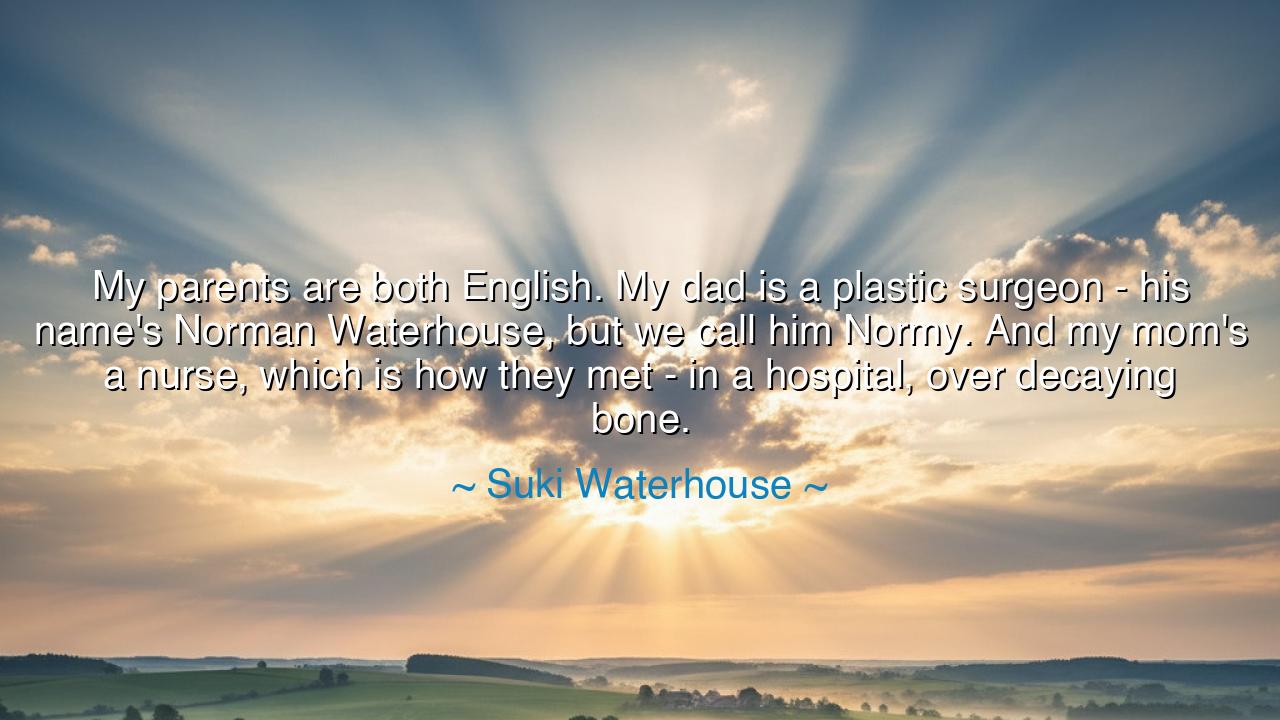
My parents are both English. My dad is a plastic surgeon - his
My parents are both English. My dad is a plastic surgeon - his name's Norman Waterhouse, but we call him Normy. And my mom's a nurse, which is how they met - in a hospital, over decaying bone.






“My parents are both English. My dad is a plastic surgeon — his name’s Norman Waterhouse, but we call him Normy. And my mom’s a nurse, which is how they met — in a hospital, over decaying bone.” — Suki Waterhouse.
Thus spoke Suki Waterhouse, model, actress, and singer, reflecting with humor and tenderness upon the curious story of her parents’ meeting — a moment both ordinary and profound. Beneath the wit of her words lies a deeper truth about the strange beauty of human connection: that love often arises not in gardens of perfection, but in places marked by imperfection, labor, and decay. Her parents met not in a ballroom or beneath a golden sky, but “over decaying bone,” in the humblest of settings — a hospital, a place of suffering and healing. From that stark place of mortality was born something enduring: life, love, and family.
The origin of this quote comes from an interview in which Waterhouse described her family background — a small anecdote meant to illustrate her parents’ professions and their meeting. Yet within this seemingly casual reflection lies a symbol as old as the human heart: that beauty and love do not bloom apart from pain, but through it. Her father, a plastic surgeon, restores what has been broken or scarred; her mother, a nurse, tends to the wounded with compassion. Together, their union stands as a metaphor for the eternal dance between healing and hurt — that through care, courage, and compassion, even the decayed can become whole again.
The ancients knew this truth well. From Asclepius, the Greek god of medicine, to Hippocrates, who saw the healer as a servant of both body and spirit, they believed that healing was not merely a skill but a sacred act — one that unites the healer and the wounded in a bond of shared humanity. And so it is with love: it often begins where healing is needed most. To meet “over decaying bone” is to meet not in fantasy, but in reality — to see the fragility of life, and to choose tenderness anyway. The love that arises from such soil is not romantic in the shallow sense, but holy in the enduring one.
Think of Florence Nightingale, who tended the dying soldiers of the Crimean War not for glory, but for love of humanity. Her compassion was born in suffering’s shadow — just as Suki’s parents found companionship in a place where life and death intertwined. It is in the presence of pain that the human soul reveals its strength. Those who can love amid decay, who can find humor amid hardship, possess a rare kind of courage. They remind us that beauty is not the absence of pain, but its transformation.
In Suki Waterhouse’s words there is also the echo of gratitude — a daughter’s affectionate acknowledgment of where she comes from. Her parents’ professions, though practical and scientific, are also deeply symbolic: the surgeon, who reshapes what is damaged, and the nurse, who comforts and restores. Together they represent two halves of a whole: action and empathy, precision and care. From such union comes balance, and from such balance, new life. Even their meeting — over “decaying bone” — is an image of resurrection: from something broken, something whole emerged.
The lesson is clear: Do not wait for perfect circumstances to create love or meaning. Life’s most sacred connections often begin in the midst of difficulty, imperfection, or pain. Whether in a hospital, a battlefield, or the quiet ache of an ordinary day, the heart learns to love most truly when it learns to see through brokenness. If love can arise over decay, then there is no place too dark for beauty to bloom. Learn, then, to find grace in imperfection, and to see in others not their wounds alone, but the strength that grows around them.
So let this be the wisdom handed down from Suki Waterhouse’s story: Love is born not of glamour, but of compassion. It does not emerge in ideal conditions, but in real ones — among wounds, weariness, and work. Whether you are a healer of bodies, a comforter of hearts, or simply a seeker of light, remember that the greatest connections are forged in moments of shared humanity. Find beauty even in the places where others see only decay, and let your love — like that of a surgeon and a nurse — be the hand that heals, the heart that endures, and the laughter that remembers: even from bones, new life can begin.






AAdministratorAdministrator
Welcome, honored guests. Please leave a comment, we will respond soon